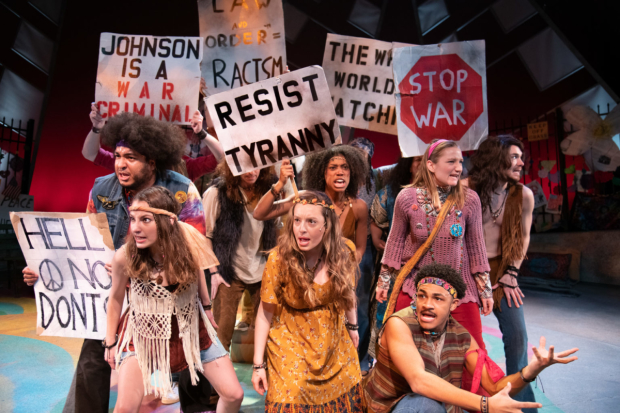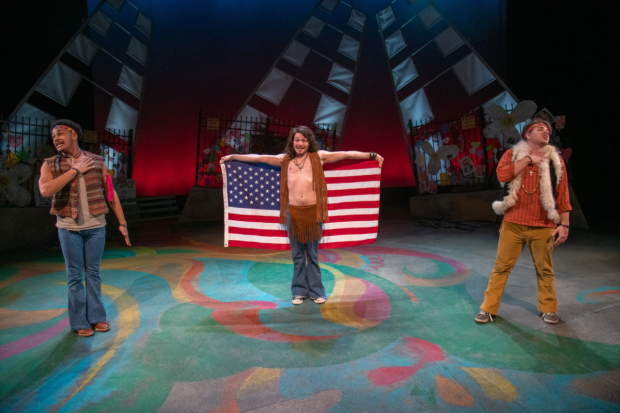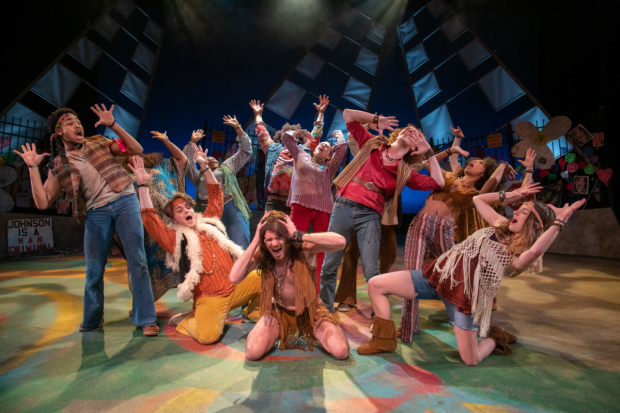Hair Lets a Little Sunshine In, but Not Enough

(© Andrew Brilliant/Brilliant Pictures)
Boston plays an interesting role in the history of Hair, the landmark 1968 Broadway musical that forever redefined what could happen on a Broadway stage. By the time Hair began previews at Boston's Wilbur Theatre in February 1970, all the controversy that surrounded the musical was already well known, and the Suffolk County District Attorney was adamant that the musical — which featured full-frontal nudity, simulations of sex, and what some thought to be desecration of the American flag — never open in Boston.
But the Hair legal team brought the case all the way to the US Supreme Court. They won, and Hair opened. It's been 50 years since the show was almost banned in Boston, and while it can no longer be considered a shocking musical, it remains an essential theatrical experience whose potency has shifted rather than diminished.
There are many things about Hair that make it a challenge to stage, so while it will always be deserving of our salute, it isn't by any means a sure bet. The New Repertory Theatre's revival, which runs through February 23, falters in that it comes off not as a gritty piece of revolutionist rock theater, but rather a sanitized museum piece rife with self-awareness.

(© Andrew Brilliant/Brilliant Pictures)
Hair centers around a tribe of hippies in New York City led by the enigmatic Claude (Eddie Simon) who trip together, love together, and protest together. Having just been drafted into the Vietnam War, Claude finds himself at a crossroads as he ls left to choose between dodging the draft as his friends have done, or succumbing to the pressure of his conservative parents.
Where this production of Hair — directed and choreographed by Rachel Bertone — fails so fatally is that the majority of the cast look like they're acting with a capital A. The success of Hair depends almost entirely on the tribe, who need to be utterly convincing without an ounce of self-awareness. Devoid of spontaneity, the musical numbers here are overly choreographed and look too rehearsed.
A few cast members come close to spontaneity, namely Katrina Pavao's Jeanie, Marge Dunn's Sheila, and tribe member Aaron Patterson. Peter Mill is a terrific Margaret Mead, a buttoned-up old woman who comes to gawk at these hippies that she's never seen before, but he's less convincing as one of the kids. Shields is largely impressive as Berger, but the character should have a more devilish gleam in his eye than he brings to it. On the other hand, Simon's Claude is a wonder, and he nails the vibe and the spirit that is integral to the success of Hair.
With only 12 cast members, the show seems needlessly thin; many professional productions of Hair have casts twice as large. Here, the big group numbers never reach a satisfying volume as the cast is regularly drowned out by the band (sound design by Kevin L. Alexander.) Also, Marian Bertone's costumes fail to consistently evoke the authentic 1960s, and Janie Howland's set doesn't help either, with its colorful chalk drawings on the stage and a few strategically placed fences from which protruding, angular rectangles jut into the sky.
Some may feel that Hair's best days are behind it, but great productions, such as Diane Paulus's 2009 revival, prove otherwise. In this production, we can see the rays of sunshine trying to peek out, but they never burn bright enough.

(© Andrew Brilliant/Brilliant Pictures)











